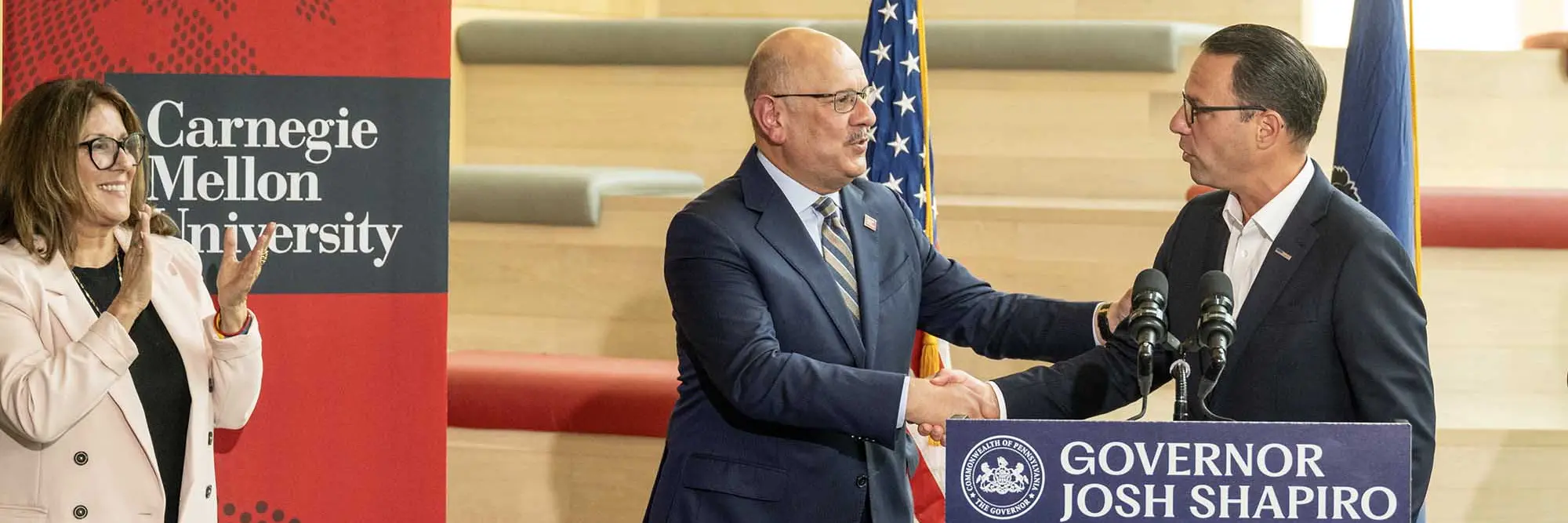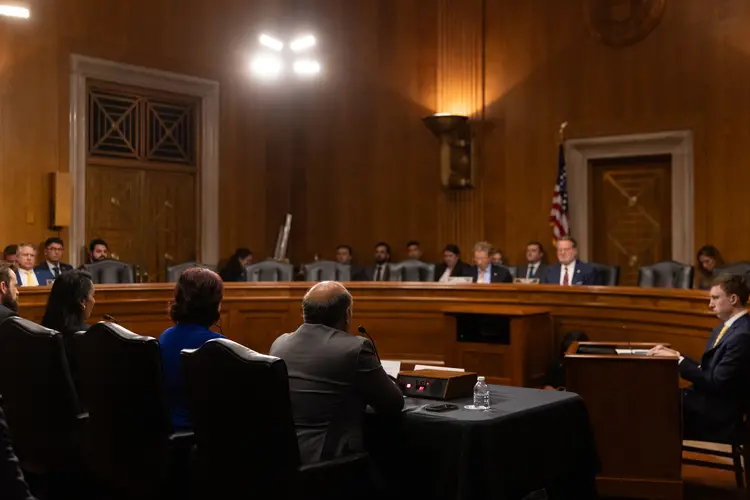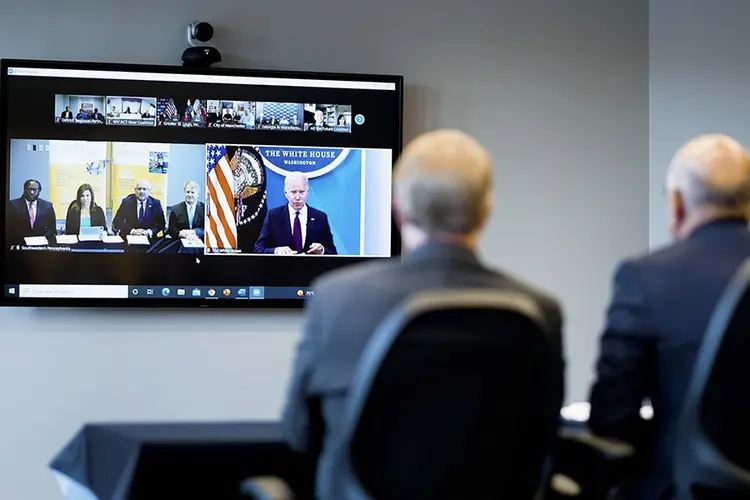
Gov. Shapiro Visits CMU — Birthplace of AI — To Sign Executive Order on Generative AI
CMU’s Block Center to partner with the Shapiro administration to leverage faculty expertise and foster research support and collaboration on generative AI usage
Media Inquiries
Carnegie Mellon University President Farnam Jahanian(opens in new window) welcomed Pennsylvania Gov. Josh Shapiro to campus on Sept. 20 to sign an executive order to establish responsible standards and a governance framework for generative artificial intelligence (AI) used by commonwealth agencies. The occasion also marked a new collaborative agreement between the Shapiro administration and CMU dedicated to promoting the responsible use of AI tools.
“When the people we serve in state government use these new technologies in their daily lives, well, they expect government to adapt and improve so we can better serve them. They expect that government will understand new technology. They expect that government will also set realistic and responsible guard rails so they can use that technology more effectively in their lives,” said Shapiro. “As a government leader, I’ve learned over the years that we need to lean in on innovation and learn to adapt to the changing tech environment in a responsible way … We don’t want to let AI happen to us, we want to be part of helping develop AI here in the commonwealth for the betterment of our citizenry.”
The governor was joined by Jahanian, Pennsylvania Secretary of Administration Neil Weaver and Chief Information Officer Amaya Capellán; Rayid Ghani(opens in new window), CMU Distinguished Career Professor in the Machine Learning Department(opens in new window) and the Heinz College of Information Systems and Public Policy(opens in new window); and Audrey Russo, president and CEO of the Pittsburgh Technology Council. The audience included elected officials, CMU trustees, student leaders, and local public and private sector leaders.
“I wanted CMU to be the backdrop for this incredibly important announcement on AI … because I know that you understand the power that technology has to transform people’s lives; transform the way we work; transform the way we get answers to our most pressing questions,” Shapiro said. “This university has long embraced the promise of new technology … And today, of course, CMU is on the frontlines of robotics and artificial intelligence research, exploring groundbreaking applications for rapidly evolving technology and also helping power our state’s economy.”
Join me at @CarnegieMellon as I take action to proactively and responsibly govern AI within the Commonwealth — and share how we’ll take advantage of AI as a tool to assist employees in serving Pennsylvanians.
Watch now: https://t.co/uzLX8XpsSg— Governor Josh Shapiro (@GovernorShapiro) September 20, 2023
“Here at CMU — the birthplace of artificial intelligence — we have a remarkable legacy of developing and using AI for good. Our differentiator is the way our scholars, our scientists, humanists, artists, technologists and policymakers team up to innovate and work together to enhance the human condition through science and technology.” — Farnam Jahanian.
The order outlines the values and principles by which commonwealth employees will utilize generative AI technologies, engage Pennsylvania’s leading AI innovation and research sector to understand potential impacts and opportunities of generative AI on the commonwealth’s workforce and digital service delivery, and establish a Generative AI Governing Board to guide commonwealth policy, use and deployment.
The 10 core values that the executive branch will use to govern the use of generative AI in Pennsylvania, are: accuracy, adaptability, employee empowerment, equity and fairness, innovation, mission alignment, privacy, proportionality, safety and security, and transparency.
“(Gov. Shapiro’s) vision recognizes the profound urgency that is defining this moment for Pennsylvania and for our nation,” said Jahanian. “The accelerating pace of innovation and technological advances is profoundly reshaping our society, in particular, generative AI — and more broadly speaking, artificial intelligence — is rapidly transforming nearly every sector of our economy including transportation, manufacturing, health care, agriculture, energy and far beyond that … Here at CMU — the birthplace of artificial intelligence — we have a remarkable legacy of developing and using AI for good. Our differentiator is the way our scholars, our scientists, humanists, artists, technologists and policymakers team up to innovate and work together to enhance the human condition through science and technology.”
Carnegie Mellon University’s Block Center for Technology and Society(opens in new window), one of the nation’s leading research centers working to shape the impact of these technologies, will partner with the Shapiro administration to create opportunities for the commonwealth to leverage faculty expertise and receive advisory support for the Generative AI Governance Board, as well as foster additional research support and collaboration on generative AI usage.
“We all know CMU has been long at the forefront of not just creating the AI technology and advancing it, but more importantly, applying it to problems that our society is facing,” said Ghani. “And even more importantly, doing it in very close collaboration with government, nonprofits and industry. And doing it in a way that is responsible and accountable and supports fair and equitable outcomes.”
CMU’s partnership with the commonwealth builds on several AI initiatives. On Sept. 19, CMU’s Delphi Research Group(opens in new window) was selected as one of 13 Centers for Innovation in Outbreak Analytics and Disease Modeling by the Centers for Disease Control and Prevention’s (CDC) Center for Forecasting and Outbreak Analytics. The Delphi Group received a five-year $17.5 million grant from the CDC to create shared resources to address outbreak analytics and disease modeling and forecasting, and will support a more effective response during public health emergencies. Additionally, in May of this year, CMU received a $20 million grant from the National Science Foundation to lead the AI Institute for Societal Decision Making(opens in new window) to improve the response to societal challenges such as disaster management and public health by creating human-centric AI tools to assist with critical decisions. The institute will also develop interdisciplinary training to bolster effective and rapid response in uncertain and dynamic situations.
This is the second time this year that CMU has hosted Gov. Shapiro. He was a featured speaker at the launch of the CMU Rales Fellows Program in February 2023.
In the News
- 90.5 WESA: Shapiro signs executive order establishing board to guide the state's use of generative AI (opens in new window)
- ABC News: Pennsylvania state government will prepare to start using AI in its operations (opens in new window)
- Pittsburgh Business Times: Shapiro signs executive order on generative AI in state government (opens in new window)
- WTAE: Gov. Josh Shapiro signs executive order at CMU concerning AI (opens in new window)



